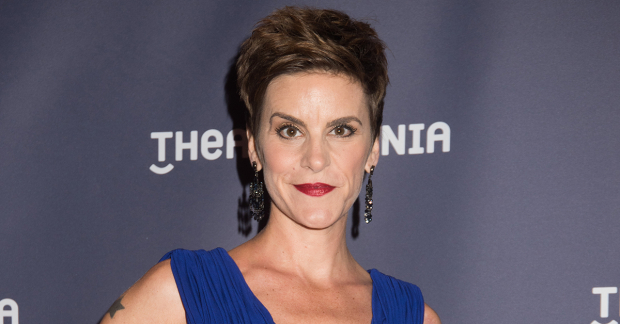Interview: Jenn Colella Hopes Shaina Taub's Suffs Inspires Audiences to Take Action
It is no surprise that Jenn Colella was chosen to portray the groundbreaking women's suffrage leader Carrie Chapman Catt in the Public Theater's world premiere production of Shaina Taub's Suffs. After all, the multifaceted actor has mastered playing real-life figures. Come From Away saw her as Captain Beverley Bass, the first female American Airlines pilot in history, and in Chaplin, she brought the house down as gossip columnist Hedda Hopper.
Suffs is yet another show in Colella's life that highlights the courage of a profoundly inspirational game-changer, alongside an ensemble cast made up entirely of female and non-binary actors. Together, they tell the story of the seven years leading to the passage of the 19th Amendment, which gave women the right to vote. The dedicated group of suffragists, who named themselves "Suffs," changed the way protesting is defined, taking to the streets and continually risking their lives to fight for change.
Colella spoke with TheaterMania about bringing Catt's ambition to the stage, and her hopes for how it will inspire others to make their own voices resonate.

(© Monica Simoes)
This conversation has been condensed and edited for clarity.
How did Suffs first land on your radar?
I have been involved with this project for six years. [Director] Leigh Silverman approached me and said they were doing a reading of this incredible piece and they wanted me to come on board. I was deeply honored and when I did come on board it was even more special than I thought it might be. There were just five of us at that point singing the entire score and at the end of it we were crying. We knew early on that this was something extraordinary.
What was it about Carrie's story that most resonated with you personally, and what were you most surprised to discover about her?
Carrie Catt is a leader of a movement that required a great deal of strength, stamina and fortitude. She has this magnitude where people will follow her, trust her and know that she is going to lead them into something special. I try to emulate those leadership qualities within a cast. She has taught me that to be a good leader you can't only lead with strength; that vulnerability, openness and humility are also quite necessary for people to trust you. It just feels like a really good fit.
It's extraordinary that Carrie wasn't just somebody who was working for the suffrage movement within the United States; she traveled all over the world and had meetings with leaders of many countries to bring this particular topic to light. The kind of fortitude and drive that she had in that time period with what it was like for women to travel alone — not to mention what it was like for women to get into rooms with those kinds of leaders — it's absolutely astounding.
How is it unique to your other theatrical experiences to be working on a piece that is essentially about women, written by a woman, and starring women and non-binary individuals?
In so many ways it's beautiful. The thing that I have noticed the most has been that anyone's suggestion is valid. If someone speaks up, then the entire room will perk up, listen and really respect what that person has to say as part of the collaborative experience. That feels genuinely feminine to me. There's a level of respect and openness to everyone in the room that isn't always present. Women are also used to kind of having to be quiet and just speak when it's really necessary. We've been taught that girls are quiet and men lead. If there aren't any men to quiet us, then we feel more open to sharing what's in our hearts and minds.
You've shined a light on women like Carrie and Beverley Bass, allowing people to witness how they rose above and changed the world. Is there a specific type of pressure in telling stories based on real people?
I think playing women who have broken glass ceilings in a typically male-dominated world can feel daunting because I want to honor their story and give a full, well-rounded depiction of them. However, I'm definitely more honored than daunted by it at this point.
Why is the story of Suffs so important now?
The suffrage story hasn't been fully heard because it isn't really taught in schools. I didn't know anything about it. I'm excited that people are going to know about how these women put their lives on the line to give us this opportunity, and more importantly, how there's still so much work to be done. It sheds a light on how we have not yet finished the fight. In 2022, women are still struggling for equality. I hope Suffs spurs people to action. The Suffs would be pissed that we aren't farther along, considering all the work they put in. I think they would encourage these extraordinary young people who are ready to jump in and fight for what's right to do just that.
What can we do to fight for what's right?
We can get up off of the couch and from behind Netflix and start to build more connections with one another so that we can take action through rallies and making calls to senators. We need to make sure we are actually moving the needle forward so that we don't get stuck in a rut like we have for the past several decades, and really take action to make sure that women's equality is on the forefront of everyone's minds.











